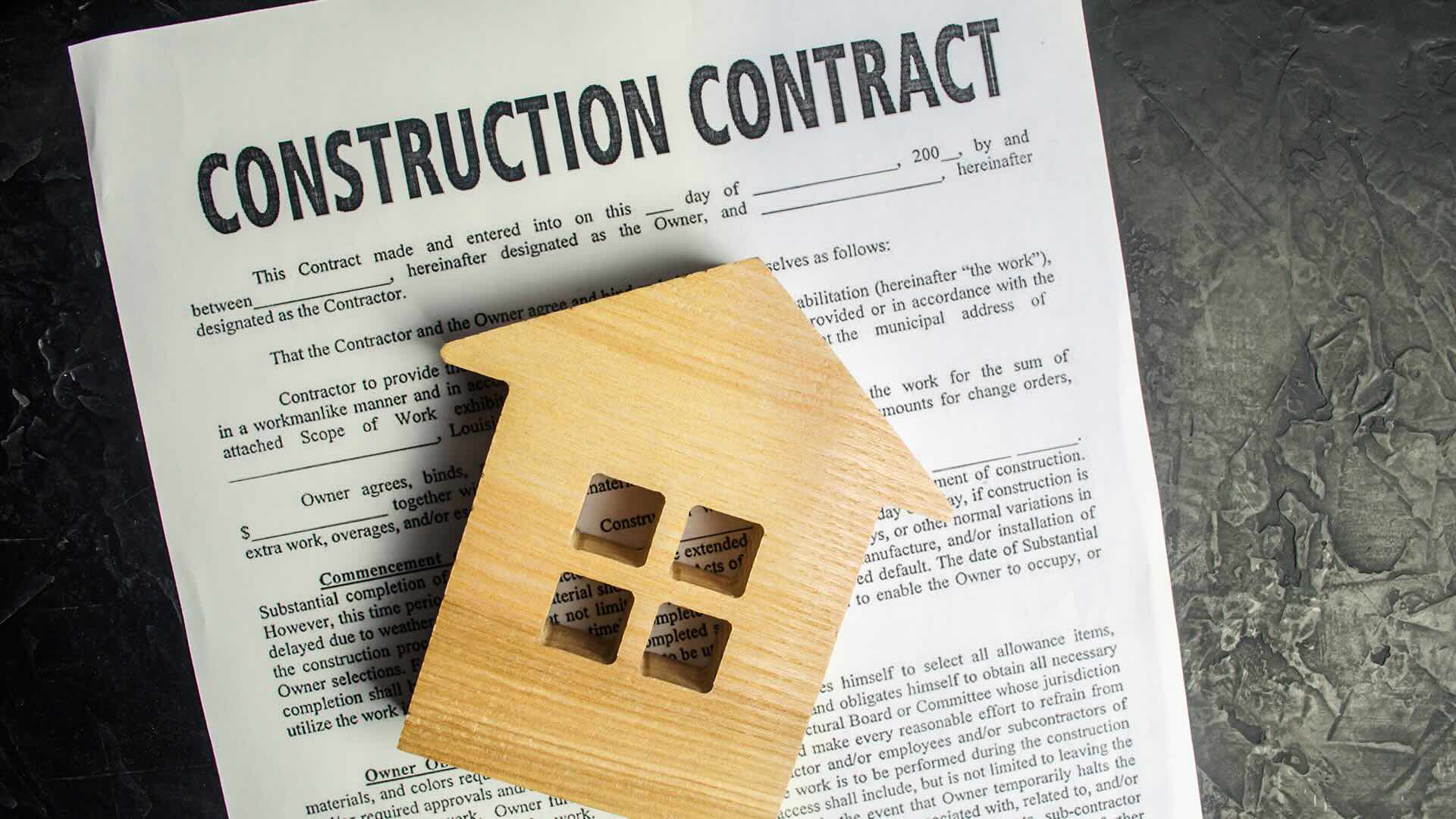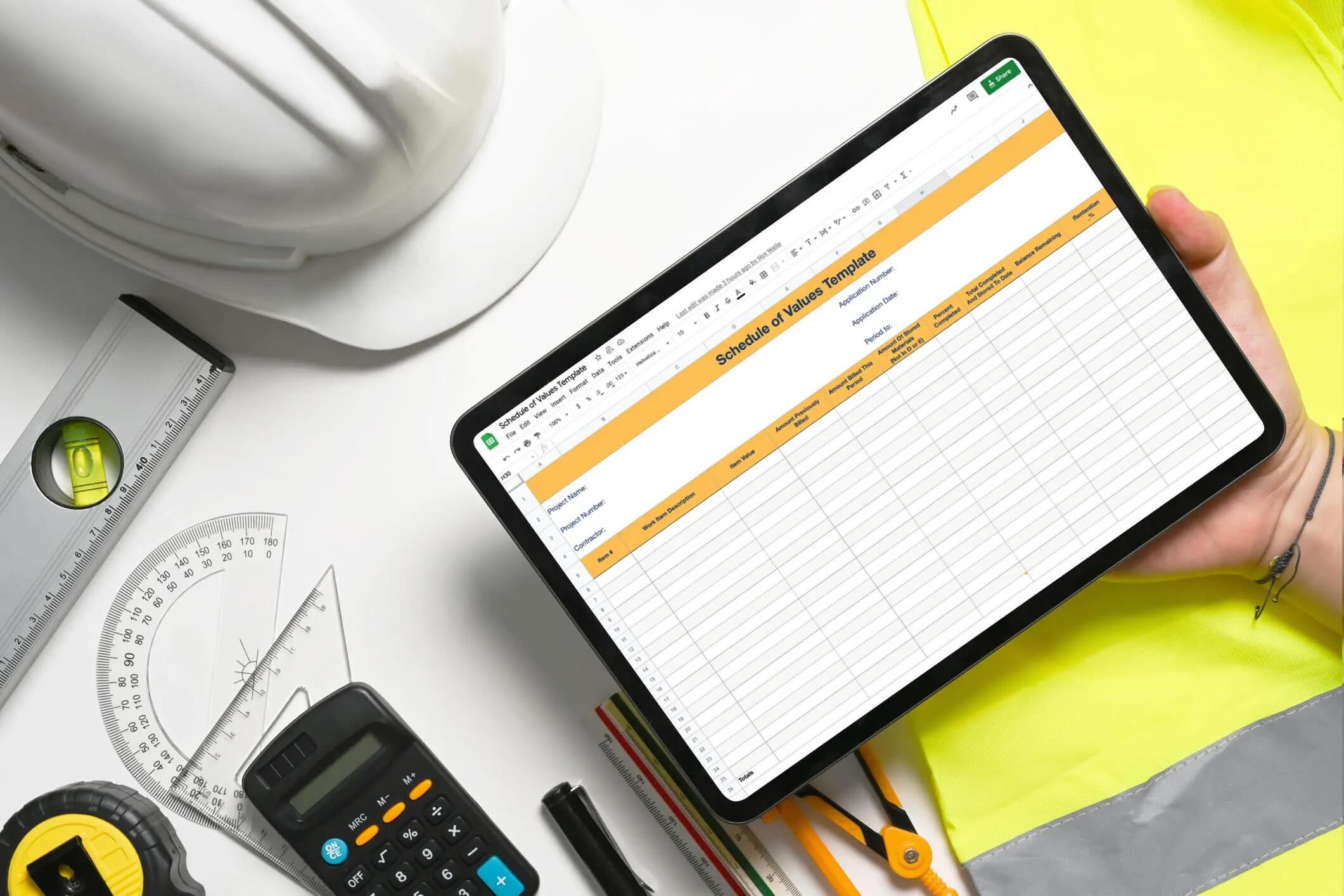Home>diy>Building & Construction>How To Get Contracts For Construction


Building & Construction
How To Get Contracts For Construction
Modified: January 4, 2024
Learn how to secure contracts for building construction projects with our expert tips and strategies. Find out the best ways to win construction contracts and grow your business.
(Many of the links in this article redirect to a specific reviewed product. Your purchase of these products through affiliate links helps to generate commission for Storables.com, at no extra cost. Learn more)
Introduction
Embarking on a construction project is a multifaceted endeavor that demands meticulous planning, skillful execution, and effective collaboration. At the heart of this intricate process lies the acquisition of construction contracts, which serve as the foundation for successful project initiation and completion. Securing contracts in the construction industry involves a strategic interplay of relationship-building, precise bidding, persuasive proposal preparation, adept negotiation, and unwavering commitment to contractual compliance.
In this comprehensive guide, we will delve into the intricacies of the construction contracting process, offering invaluable insights and practical tips to navigate this dynamic landscape. Whether you are a seasoned professional or a burgeoning entrepreneur seeking to carve a niche in the construction domain, understanding the nuances of securing contracts is paramount to your success. From fostering meaningful connections with potential clients to skillfully negotiating and ensuring contract adherence, each phase of the contracting journey is rife with opportunities to showcase your expertise and distinguish your brand in a competitive market.
Join us as we unravel the art of securing construction contracts, unraveling the complexities and shedding light on the strategic maneuvers that can elevate your contracting prowess. Let's embark on this enlightening expedition into the realm of construction contracting, where proficiency meets opportunity, and astute decision-making paves the way for enduring success.
Key Takeaways:
- Building strong relationships with potential clients through effective communication and proactive networking is crucial for securing construction contracts and fostering enduring partnerships in the industry.
- Crafting compelling bids and proposals, negotiating with transparency and flexibility, and ensuring contract compliance are essential steps in securing construction contracts and delivering exceptional projects.
Read more: How To Get Government Construction Contracts
Understanding the Construction Contracting Process
Before delving into the intricacies of securing construction contracts, it is imperative to grasp the fundamental dynamics of the contracting process. Construction contracts serve as legally binding agreements between the project owner and the contractor, delineating the scope of work, project timelines, financial arrangements, and other essential terms and conditions. These contracts not only provide a blueprint for project execution but also safeguard the interests of all involved parties, fostering clarity and accountability throughout the construction journey.
One of the pivotal aspects of the construction contracting process is the identification of potential clients or project owners seeking construction services. This entails thorough market research, networking within the industry, and staying attuned to upcoming projects and developments. By understanding the specific needs and preferences of potential clients, contractors can tailor their approach and offerings to align with the project requirements, thereby enhancing their chances of securing lucrative contracts.
Furthermore, comprehending the various types of construction contracts is essential for navigating the diverse landscape of construction projects. Whether it be lump-sum contracts, cost-plus contracts, time and material contracts, or design-build contracts, each variant carries distinct implications for project management, risk allocation, and financial considerations. Familiarizing oneself with these contract types empowers contractors to make informed decisions and adapt their strategies to suit the unique demands of each project.
Moreover, the construction contracting process involves meticulous assessment and estimation of project costs, encompassing materials, labor, equipment, permits, and other pertinent expenses. Accurate cost estimation is pivotal in formulating competitive bids and proposals, as it enables contractors to demonstrate their financial acumen and offer compelling value propositions to potential clients.
By comprehensively understanding the construction contracting process, contractors can position themselves as knowledgeable and reliable partners for prospective clients, laying the groundwork for fruitful collaborations and enduring success in the competitive construction industry.
Building Relationships with Potential Clients
In the realm of construction contracting, fostering strong and enduring relationships with potential clients is a cornerstone of success. Establishing a robust network of clientele not only amplifies the visibility of a contracting business but also cultivates trust, credibility, and a favorable reputation within the industry. Building these relationships requires a multifaceted approach that encompasses proactive networking, effective communication, and a keen understanding of client needs and preferences.
Networking serves as a linchpin in the process of connecting with potential clients. Engaging in industry events, trade shows, and professional associations provides invaluable opportunities to forge meaningful connections and showcase the expertise and capabilities of a contracting firm. Additionally, leveraging digital platforms and social media channels can expand the reach of a contracting business, enabling it to engage with a wider audience and stay abreast of industry trends and client requirements.
Effective communication forms the bedrock of relationship-building in the construction domain. Clear, transparent, and responsive communication fosters trust and confidence among potential clients, demonstrating a contractor’s commitment to understanding and addressing their needs. Whether through in-person meetings, virtual interactions, or written correspondences, adept communication skills are instrumental in conveying professionalism and reliability, setting the stage for fruitful collaborations.
Understanding the unique needs and preferences of potential clients is pivotal in tailoring services and proposals to align with their expectations. This entails active listening, empathy, and a proactive approach to discerning the intricacies of each client’s vision and project requirements. By demonstrating a genuine interest in their projects and exhibiting a willingness to customize solutions to suit their specific needs, contractors can distinguish themselves as attentive and client-centric partners.
By diligently nurturing relationships with potential clients, contractors can position themselves as trusted allies and preferred collaborators, laying the groundwork for securing coveted construction contracts and fostering enduring partnerships in the dynamic construction industry.
Bidding and Proposal Preparation
The process of bidding and proposal preparation in construction contracting is a pivotal phase that demands meticulous attention to detail, strategic acumen, and persuasive communication. Crafting compelling bids and proposals is not merely a formality but a strategic opportunity to showcase a contractor’s expertise, value proposition, and commitment to fulfilling the client’s vision. This phase involves a multifaceted approach that encompasses accurate cost estimation, comprehensive project planning, and adept articulation of the contractor’s capabilities and unique selling points.
Accurate cost estimation lies at the crux of effective bidding and proposal preparation. Thoroughly assessing the project’s scope, materials, labor, equipment, and overhead costs is essential in formulating a competitive and realistic bid. A comprehensive understanding of prevailing market rates, industry benchmarks, and cost-saving measures empowers contractors to present financially viable proposals that resonate with potential clients.
Project planning and scheduling are integral components of a compelling bid and proposal. Demonstrating a clear and well-structured plan for project execution, timelines, and deliverables instills confidence in potential clients, showcasing the contractor’s organizational prowess and commitment to timely and efficient project completion. Incorporating visual aids such as Gantt charts, project timelines, and 3D renderings can enhance the clarity and impact of the proposal, enabling clients to envision the proposed project with clarity and confidence.
Moreover, articulating the contractor’s unique capabilities, past successes, and value-added services is paramount in setting the bid apart from competitors. Highlighting relevant experience, industry accolades, and testimonials from satisfied clients can bolster the credibility and appeal of the proposal, instilling trust and confidence in the contractor’s ability to deliver exceptional results.
Persuasive and concise communication is a hallmark of effective proposal preparation. Crafting a compelling narrative that succinctly captures the project’s essence, the contractor’s value proposition, and the anticipated outcomes can captivate potential clients and differentiate the bid from competing proposals. Emphasizing the alignment of the contractor’s vision with the client’s objectives and aspirations fosters resonance and rapport, setting the stage for a mutually beneficial partnership.
By adeptly navigating the intricacies of bidding and proposal preparation, contractors can position themselves as formidable contenders for coveted construction contracts, leveraging their expertise and strategic prowess to secure impactful projects and forge enduring client relationships.
Networking with other professionals in the construction industry, attending industry events, and joining relevant associations can help you get contracts for construction.
Negotiating and Securing Contracts
The art of negotiating and securing construction contracts requires finesse, strategic acumen, and a keen understanding of client expectations and industry dynamics. This pivotal phase marks the culmination of meticulous preparation, persuasive communication, and adept relationship-building, as contractors endeavor to formalize their partnership with potential clients and embark on transformative construction projects.
Effective negotiation hinges on a comprehensive understanding of the project scope, client requirements, and the contractor’s value proposition. Engaging in open dialogue and active listening enables contractors to glean insights into the client’s priorities, concerns, and expectations, laying the groundwork for a collaborative and mutually beneficial contractual arrangement.
Transparency and flexibility are paramount in the negotiation process. Clearly delineating the terms, conditions, and deliverables while remaining open to accommodating reasonable client requests fosters trust and confidence, positioning the contractor as a reliable and accommodating partner. Balancing assertiveness with adaptability is instrumental in navigating negotiations with finesse and ensuring that the finalized contract aligns with the interests of both parties.
Moreover, showcasing a proactive commitment to problem-solving and risk mitigation can instill confidence in potential clients, demonstrating the contractor’s preparedness to address unforeseen challenges and uphold the integrity of the contractual agreement. By presenting comprehensive risk management strategies and proactive contingency plans, contractors can assuage client concerns and bolster their credibility as capable and reliable partners.
Securing contracts entails not only finalizing the terms and conditions but also fostering a sense of partnership and shared vision with the client. Emphasizing the collaborative nature of the contractual relationship and articulating the contractor’s dedication to realizing the client’s aspirations can engender a spirit of mutual trust and commitment, laying a solid foundation for a successful and harmonious collaboration.
By adeptly navigating the negotiation process and securing contracts, contractors can solidify their foothold in the construction industry, embarking on transformative projects and fostering enduring partnerships that epitomize excellence, collaboration, and mutual success.
Ensuring Contract Compliance
Once a construction contract has been secured, the meticulous work of ensuring contract compliance commences, underscoring the contractor’s commitment to upholding the terms, delivering exceptional quality, and fostering a harmonious and productive partnership with the client. Contract compliance encompasses a multifaceted approach that spans legal adherence, project management, quality assurance, and proactive communication, all geared towards realizing the client’s vision and safeguarding the integrity of the contractual agreement.
Adhering to legal and regulatory requirements is foundational to contract compliance in the construction domain. Ensuring that the project complies with building codes, zoning regulations, environmental standards, and safety protocols not only mitigates legal risks but also underscores the contractor’s dedication to ethical and responsible project execution. Proactively addressing potential compliance issues and promptly rectifying any deviations from regulatory mandates showcases the contractor’s commitment to upholding the highest standards of quality and integrity.
Effective project management is instrumental in ensuring seamless contract compliance. Establishing clear project milestones, timelines, and deliverables, and diligently tracking progress and performance enables contractors to proactively address any deviations from the agreed-upon scope and timelines. Embracing transparency and proactive communication with the client regarding project milestones, challenges, and achievements fosters a collaborative spirit and instills confidence in the contractor’s ability to deliver on its promises.
Quality assurance stands as a cornerstone of contract compliance, reflecting the contractor’s dedication to delivering exceptional craftsmanship and superior outcomes. Implementing robust quality control measures, conducting regular inspections, and adhering to industry best practices underscore the contractor’s unwavering commitment to excellence, instilling trust and confidence in the client and affirming the contractor’s adherence to the highest standards of workmanship.
Proactive communication and issue resolution are pivotal in ensuring contract compliance. Addressing client concerns, promptly responding to inquiries, and proactively apprising the client of project developments and challenges fosters transparency and trust, reinforcing the collaborative and client-centric ethos of the contractual relationship.
By meticulously upholding contract compliance, contractors can solidify their reputation as reliable, ethical, and proficient partners, fostering enduring client relationships and paving the way for sustained success and distinction in the dynamic construction industry.
Conclusion
The journey of securing construction contracts is a dynamic and multifaceted expedition that demands strategic acumen, unwavering commitment, and a client-centric ethos. From the initial stages of relationship-building and networking to the culminating phases of negotiation, contract compliance, and project execution, each facet of the contracting process presents unique opportunities to showcase expertise, foster meaningful partnerships, and deliver transformative construction projects.
Understanding the intricacies of the construction contracting process is foundational to navigating the competitive landscape of the industry. By comprehensively grasping the nuances of contract types, cost estimation, and project planning, contractors can position themselves as knowledgeable and reliable partners, adeptly aligning their offerings with the unique needs and aspirations of potential clients.
Building robust relationships with potential clients forms the bedrock of successful contracting endeavors. Proactive networking, effective communication, and a keen understanding of client requirements enable contractors to cultivate trust, credibility, and a favorable reputation, setting the stage for enduring partnerships and coveted contract opportunities.
Bidding and proposal preparation represent strategic opportunities to articulate the contractor’s value proposition, unique capabilities, and commitment to realizing the client’s vision. By adeptly crafting compelling bids and proposals that underscore expertise, financial acumen, and a client-centric approach, contractors can distinguish themselves as formidable contenders for impactful construction projects.
Negotiating and securing contracts requires finesse, transparency, and a collaborative spirit. Through open dialogue, proactive problem-solving, and a commitment to aligning the contractual agreement with the interests of both parties, contractors can formalize partnerships that epitomize trust, mutual respect, and a shared vision for project success.
Ensuring contract compliance underscores the contractor’s dedication to upholding the highest standards of quality, legal adherence, and proactive communication. By meticulously managing project milestones, quality assurance, and regulatory compliance, contractors can solidify their reputation as reliable, ethical, and proficient partners, fostering enduring client relationships and paving the way for sustained success in the construction domain.
Embarking on the journey of securing construction contracts is not merely a transactional endeavor but a transformative voyage that encapsulates the essence of collaboration, excellence, and mutual success. By embracing the strategic insights and best practices outlined in this guide, contractors can navigate the contracting landscape with confidence, distinction, and a steadfast commitment to delivering exceptional construction projects that resonate with clients and leave an indelible mark on the built environment.
Frequently Asked Questions about How To Get Contracts For Construction
Was this page helpful?
At Storables.com, we guarantee accurate and reliable information. Our content, validated by Expert Board Contributors, is crafted following stringent Editorial Policies. We're committed to providing you with well-researched, expert-backed insights for all your informational needs.















0 thoughts on “How To Get Contracts For Construction”